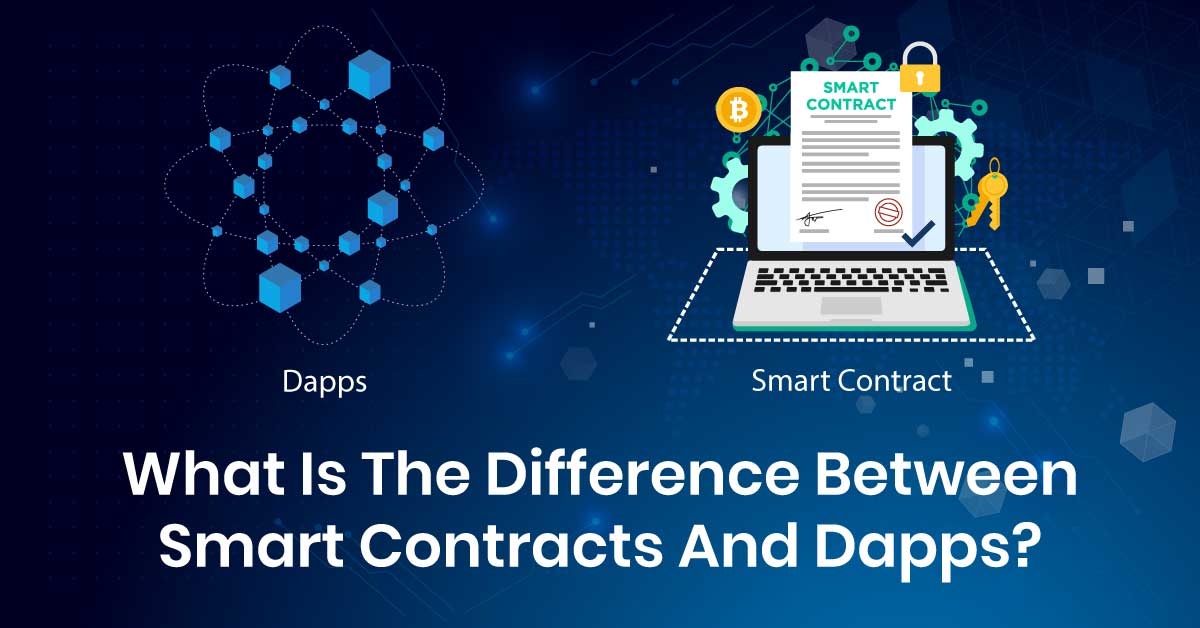Smart contracts and dApps are two terms people often use interchangeably, but they represent two entirely different concepts that are taking blockchain to skyrocket heights. While software creates smart contracts, dApps run on the Ethereum network. Smart contracts have become more common in blockchain development over the last few years because of their power as a decentralized application – Dapps!
The business world nowadays depends entirely on digitization. Crypto has supported this trend with the help of its unique apps. While most of us might have heard popular terms like Bitcoin and NFTs, only a few of them actually know about smart contracts or dApps. So, let us see these and why they have become so essential for blockchain technology.
Whatever these are, you need to go for a dApp audit & smart contract audit if you do not wish to lose access to your hard-earned digital assets!
What are smart contracts?
In the real world, contracts are agreements that are created between parties so that a certain task can be done when all the set conditions are met. This process takes place under the supervision of a central authority or a third-party intermediary whom all parties honor.
Unlike these, smart contracts are digital contracts that happen on different blockchains. These programs execute on their own when they meet all the pre-determined conditions. This process is decentralized and doesn’t require the presence of a central authority or third-party intermediary. So, the users have full control over their funds and can monitor the transactions independently.
However, other than the simple agreements, there is a wide range of use cases of smart contracts in different applications as well. Thus, smart contracts are the ‘backbone of complex blockchain applications–from automatic lending funds to minting large numbers of NFTs, we can use them everywhere!
What are Decentralized Applications (dApps)?
Just like there are hundreds of applications on your smartphone today, decentralized apps or dApps are the ones that harness the power of blockchain technology. They create unique user experiences on their phones and laptops.
The difference between these two types of applications is that dApps do not have any individual company or entity that looks after the data on the platform. Users own the data and store them on the blockchain.
dApps are decentralized, open-source, and public. Therefore, anyone who wishes to examine them or create their own apps can easily do that. The foundation of decentralized applications is smart contracts. They handle every task on these apps, which includes automatic transactions, distributing digital assets, and many more.
There are various use cases of dApps, with DeFi being the most popular one. It encompasses lending and borrowing money without going to a bank, investments, payment solutions, games, and more. DeFi smart contract is the heart and soul of dApps.
Decentralized Applications (dApps) V/S Smart Contracts: The Difference
Both dApps and smart contracts indeed work on the blockchain. However, you cannot use them interchangeably. As we have already mentioned, smart contracts are the backbone of many functions users perform on blockchains. dApps is one of those that work because of smart contracts.
General users cannot access these contracts without an interface. And dApps give this interface. In terms of traditional software, smart contracts serve as API, and dApp is the user interface for a program.
Pros and Cons of smart contracts and dApps
These are the advantages of smart contracts.
- Developers can easily automate complex tasks on the blockchain with the help of smart contracts.
- Due to smart contracts’ irreversible and transparent nature, users can view all the actions on the blockchain.
- It is decentralized–there is no need for intermediaries or central authority to supervise the transaction record.
Following are the disadvantages of smart contracts.
- They are not foolproof, meaning they can have bugs or vulnerabilities.
- It is only possible for some to create and operate smart contacts.
- Since we cannot changed the actions on the blockchain, if there are any accidental transactions or errors, then we cannot undo it.
These are the pros of dApps.
- These dApps are completely decentralized, so there is no large company behind the app.
- As they are open-source, you can easily verify their functionality and use their codes in your projects.
- They operate on a distributed ledger and don’t have any centralized servers. Thus, hacks are rare, and their operations have almost no downtime.
Following are the cons of dApps
- If you build your smart contract on Ethereum, then there can be two major issues: network congestion and expensive transaction fees.
- It requires time to implement as it is a complex procedure that requires every node to apply the update.
dApps and smart contracts work on the blockchain but are not the same. Hopefully, you know the difference between them now.

As the editor of the blog, She curate insightful content that sparks curiosity and fosters learning. With a passion for storytelling and a keen eye for detail, she strive to bring diverse perspectives and engaging narratives to readers, ensuring every piece informs, inspires, and enriches.










